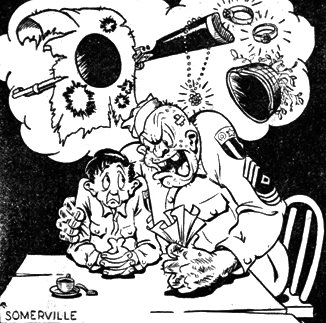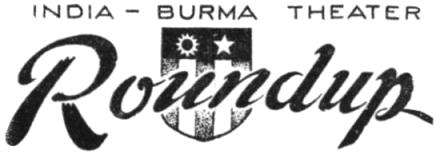
Vol. 3 No. 43 Delhi, Thursday, June 28, 1945 Reg. No. L5015
As 10th’s Chief Roundup Staff Article Uncle Joe Stilwell has returned to the grim but satisfying business of killing Japs - as Commanding General of the U.S. 10th Army, which this week annihilated the remnants of enemy opposition on bloody Okinawa. Okinawa's soil today contains the mortal remains of Lt. Gen. Simon Boliver Buckner, Jr., the colorful commander who led the new 10th Army ashore last Easter Sunday. In their last hour of military triumph, G.I.'s and his ranking officers reverently buried the general beside the men of the Seventh Division. The nation applauded the move that placed four-starred Uncle Joe in command of the 10th Army. Said the New York Times: ORNERY SWEETNESS "In any case, the American public will be glad to see him at the front again. The affectionate name his soldiers gave him cannot disguise the soundness of his character, his high abilities and if he doesn't mind, a certain ornery sweetness in his disposition." There was considerable speculation on the possibility of Stilwell leading an attack upon the Chinese coastline. New York's PM summed up this surmise by stating: "Uncle Joe is on the road back to China. As head of the 10th Army, he likely will spearhead the Allied landing on the China coast - territory and terrain he knows as well as soldiers know his rough tongue and his soft heart. To Stilwell for his past accomplishments and future victories, Hats off!" Stilwell declared at his recent conference with Gen. Douglas MacArthur in Manila that he was convinced there was no crackup of Japanese morale and that the enemy would have to be beaten on the Chinese mainland as well as in the home islands before giving up their invaded possessions. MacArthur's appointment makes it a virtual certainty that Stilwell will be one of the top commanders in the battle for Japan. His new post will give him the long-sought opportunity for revenge for the "hell of a beating" inflicted upon his Chinese and American forces with whom he was forced to walk out of Burma in 1942. BURMA LIBERATED While in Chungking and India, Stilwell helped plan and carry out the liberation of North Burma and the building of the Ledo Road which later took his name. Subsequent differences of opinion with Chiang Kai-shek led last October to Uncle Joe's recall to Washington where he was given command of Army Ground Forces. Stilwell carried out his job with AGF with determination and spirit, bit no one doubted that it was his prayer to be returned to a combat assignment against the Japanese. The death of Buckner brought to 34 the number of U.S. generals lost from all causes in action thus far in World War II, including four lieutenant generals. Shortly after the 10th Army Commander was killed, Brig. Gen. Claudius M. Easley, assistant commander of the 96th Infantry Division on Okinawa, also died in action. |
I-B CHIEF AT MANDALAY
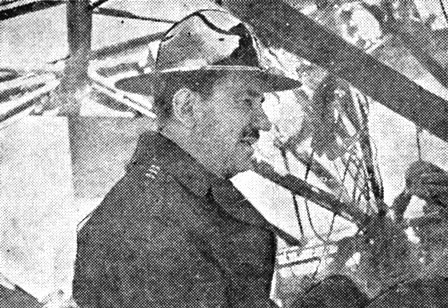 Lt. Gen. R. A. Wheeler, new commanding general of the India-Burma Theater, made frequent flying trips to the
war fronts in his capacity as Deputy Supreme Commander of SEAC. His was a familiar face in the Burma campaign
fought by the NCAC units and the British 14th Army. Here the General is shown at Mandalay.
Lt. Gen. R. A. Wheeler, new commanding general of the India-Burma Theater, made frequent flying trips to the
war fronts in his capacity as Deputy Supreme Commander of SEAC. His was a familiar face in the Burma campaign
fought by the NCAC units and the British 14th Army. Here the General is shown at Mandalay.
CHINA SUPPLY MISSION OF I-B, SAYS WHEELER
By SGT. ART HEENAN Roundup Staff Writer
Newly-appointed India-Burma Commander, Lt. Gen. R. A. Wheeler leaves no doubt in anyone's mind that the continuing mission of American troops in this Theater is to get war materiel to China.
"We are here to supply and keep supplying our Chinese ally," he emphasized in a clear-cut Midwestern accent. "And our success will be measured by how China is satisfied with what she is getting."
I interviewed the new Theater leader in New Delhi. He was preparing to return to SEAC Headquarters at Ceylon where he holds the dual posts of Deputy Supreme Commander to Lord Louis Mountbatten and Principal Administrative Officer to that command.
"But I'll be back next week and make my permanent headquarters in New Delhi," he stated. The General explained that his SEAC administrative office has a rear echelon in Delhi, under British Brigadier Benoy and U.S. Colonel K. B. Keating, through which he can perform his PAO duties. From Delhi, he will also be available to fly to Kandy to take over as Supremo in the event of Lord Louis's absence.
ALERT INDIVIDUAL
An alert, personable individual who wears his stars with ease, the new Theater Commander made conversation simple. Knowing he was pressed for time, I expected to be allotted about 15 minutes since it was a private interview and not a press conference. But an hour went by before I left.
It was the same morning that it was announced that Gen. Joseph W. Stilwell had taken over command of the 10th Army on Okinawa. It was the first Gen. Wheeler had heard of the new assignment. He smiled and said, "That's very good news. MacArthur and Stilwell are a team that really knows the Japs. They will give them no rest until they are beaten to their knees."
The Theater Commander recalled that Uncle Joe had been one of his instructors at West Point. He said he had met the former CBI head at Baghdad in 1942 when he was en route to set up the command here. At that time, Gen. Wheeler, whose overseas service dates from November, 1941, was going about his assigned duty of setting up the Persian Gulf Command.
CODE IN CODE
"But in February, 1942, I received a coded wire sent in the highest priority from the War Department," he said. "Unfortunately, it was not in the same code that had been given to me. I went up to the American consulate in Basra but they couldn't decode it either. I wired the War Department explaining the situation, and was told to see the consul in Basra. I wired back I had done that already and he couldn't help."
The general laughed as he continued, "So they sent me back a wire in my own code explaining the key of the other code. It turned out that the message was an order assigning me to set up the Service of Supply for the newly-organized CBI Theater."
General Wheeler arrived in Karachi on March 9, 1942. He had little time to study the setup as the first 10th Air Force elements arrived four days later. Their supplies and equipment had been diverted in Australia. All they had with which to fight a war were their barracks bags.
EVERYTHING IN SIGHT
The SOS chief immediately requisitioned everything in sight, including boxed goods on the piers. Red tape went out the window and the 10th Air Force began operations.
It was a month later that Gen. Wheeler arranged what was probably the first reverse Lend-Lease in any overseas theater. Acting with what seems to be typical efficiency, he went to Delhi and asked an Indian Government official if it would not be possible to give supplies to the Americans here and credit it against the goods that were being received on Lend-Lease.
The Indian Government official agreed. "After I had ascertained he had the necessary authority to make such a commitment, I wired Washington for permission. They granted the necessary authorization. So debit Lend-Lease, as we called it then, started soon after," explained the General.
Gen. Wheeler is remembered by many officers and enlisted men from his SOS days in the CBI. When I mentioned this, he replied "Yes, I see a lot of familiar faces around. It's a fine feeling to get back to old friends, officers and men. I know I have a seasoned and capable staff, and if everyone continues to function and devote the best of his energy as has been done in the past, there will be no cause for worry."
CALMS COLONEL
The General's reference to seeing familiar enlisted faces brought back my memory to 1943, concerning a lieutenant colonel who was a stickler for military courtesy, even to the detriment of work. The colonel, even in 116 degrees, made every man who came up to his desk salute and stand at attention. Even if the man had to bring papers up every 10 minutes, the procedure was the same. Every time this colonel left the office and returned, he had an Adjutant handy who would call attention and everyone would have to take time off from work and rise.
One day, then Maj. Gen. Wheeler came into the office. He went over to a sergeant whom he apparently knew, tapped him on the shoulder, and asked him how he was. Someone identified the visitor and called attention. Before anyone could move, the General waved them to remain seated. Knowing most of the men there were newly arrived, he asked them how they liked the Indian heat, then smilingly departed. After that, the G.I. colonel calmed down.
HELPS G.I.'S
While on the topic of enlisted men, it might be apropos to mention that one of the first unofficial acts of the new Theater chieftain was to help a G.I. The man in question had an emergency furlough cleared. But the usual Army red tape had him enmeshed, lack of a replacement, transportation, etc. Gen. Wheeler heard of the incident and by the time you read this the man will be on his way home, by air. The story was related to me by the G.I. himself, who had only known the General casually.
In his duties as Deputy Supreme Commander of SEAC, Gen. Wheeler has made the rounds of this Theater so often that it's beginning to seem like home. He made frequent trips to the front lines to report and observe battle progress. I asked his aide, Maj. John Jones, an old Merrill Marauder, how much the General had flown in past months in his plane, Flyspeck, called after his nickname, "Speck." He received this nickname while attending West Point, where it was said he knew his lessons so well that he had even memorized the fly-specks in his text books.
"I believe he has flown around 6,000 to 8,000 miles monthly lately," stated the major. "On his last inspection trip to Rangoon, we had trouble with a motor over the water. When we landed at Akyab we had all lost a few pounds."
After shaking hands with me, Gen. Wheeler's parting words were "Sergeant, if there are any problems or stories that seem to be puzzling the men or need clarification stop in and see me, I'll always be accessible without going through channels."
|
Theater Chief Praises Record Of I-B Troops
Lt. Gen. R. A. Wheeler, India-Burma Theater Commander, speaking over the fifteen stations of the Army Radio Network in India and Burma, Tuesday issued the following statement to his command: "I am glad to be in the India-Burma Theater again among so many old friends. It makes me happy to be back with the troops I had to leave in October, 1943, when I relinquished command of the Services of Supply to assume duties in the newly-formed Southeast Asia Command. Great progress has been made under the inspiring leadership of Gen. Stilwell and Gen. Sultan. I am proud to follow in their footsteps. The Burma campaign has been brought to a successful conclusion. The Stilwell Road and the pipeline have been built. Air tonnage over The Hump has been pushed to about 50,000 tons a month. Telephone and telegraph communications have been constructed linking China to India. Our mission has not changed. We are part of the team whose aim is the defeat of the Japs. The role assigned to us is that of supplying China. We must get the maximum military supplies to China in the minimum time. This we will do. Some of you are wondering if the change in Theater commanders will make any difference in your going home. It will not. I will continue the policy of getting you men home as soon as you can be spared from your jobs and as fast as there is transportation to carry you. You men of the India-Burma Theater have made an enviable record. I know that I am taking command of a Theater whose troops have been tried and proved. We are going to keep an ever increasing volume of supplies rolling over the lifeline to China, where they can be used to blast all hopes of the Japs and contribute our share in the final drive toward our inevitable victory." Lt. Gen. Dan I. Sultan, on his departure from the India-Burma Theater this week, extended this message to all officers and men in I-B: "In no command have I ever seen greater loyalty, devotion to duty, willingness to work and fight under extremely adverse conditions. "We have been entirely successful in all our combat missions, as the Jap knows to his bitter sorrow. Working as a team with our British and Chinese Allies, the men of the India-Burma Theater have made a record which has not been excelled in any other theater. "I am leaving the Theater and my friends here with many regrets. Good luck and God bless you all." |
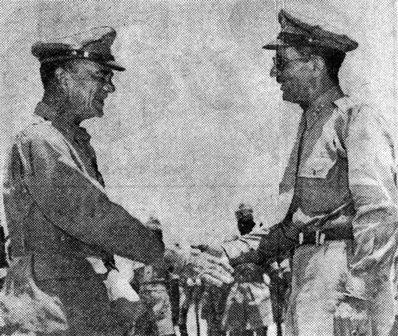 Lt. Gen. Dan I. Sultan (left) shakes hands with his successor, Lt. Gen. R. A. Wheeler, India-Burma Theater
Commander, at Willingdon Airport, Delhi, just before Sultan took off for the U.S.
Lt. Gen. Dan I. Sultan (left) shakes hands with his successor, Lt. Gen. R. A. Wheeler, India-Burma Theater
Commander, at Willingdon Airport, Delhi, just before Sultan took off for the U.S.
|
During Sultan India-Burma Command
By SGT. JOHN DERR Roundup Staff Writer
"The road to China is cleared of Japs - start the convoy on its way."
When he spoke these words to members of the staff of his North Burma field headquarters last January, energetic, resourceful Lt. Gen. Dan I. Sultan, who turned over India-Burma Theater command to Lt. Gen. R. A. Wheeler this week, enjoyed his greatest thrill in a long and varied Army career.
As the gruff-looking but soft-spoken successor to Uncle Joe Stilwell prepared to take his plane for the States last Friday, his eyes twinkled with brilliancy as he recalled the thrill that came with the actual order to open The Road.
Sultan had known first-hand what it meant to be able to say North Burma was cleared of the Japanese, that the Engineers had scored their signal victory over nature and that supplies were ready to start rolling to China.
The 59-year-old general had a satisfied look as he granted his last press interview in his command, exclusive to the Roundup, and prepared for the trip home. Sultan could have had many reasons to smile. Any man with orders going home is allowed that privilege. Any Theater commander who has done his job with such recognized success could be granted that look of satisfaction.
"You know it's been a real pleasure to serve out here with the men of this command," he told me. He casually lit a cigarette, continued: "I'm very proud of the men and the job they have done and are doing. And they have reasons to be proud of themselves.
"I have seen the team keep plugging away, in spite of setbacks. When they ran into difficulties, every man buckled his belt and kept right on struggling to make a success of our missions."
He recalled the fine loyalty and perseverance of the men who have served under him. He couldn't seem to put in words his sincere feeling about these fellows.
"These men refused to be delayed by acts of man or God," was his tribute. "They knew we were a low priority Theater. There were things we thought we needed in order to get the job done, but when these weren't available, the men pitched in and did the job - and did it well - with whatever was available.
"Everyone knew the extreme conditions under which our men in the forward areas worked... And the loyalty of the men out there - it made you choke to think of it..." Sultan said.
The General was writing a short statement when I entered his drawing room. He said it was impossible to tell everyone in person how he felt about the jobs they had been doing; he'd have to call on the Roundup to help him again. His desire was to let the men know that he knew - and appreciated - the big jobs they, officers and G.I.'s had been doing.
|
With appropriate blushes, the Roundup publishes the following letter written by an Ordnance officer which brings forcibly home a primary journalistic law: Check your facts.
Dear Roundup: "Advertisement Prompts Question?" banners our crusading fishwrapper, the India-Burma Roundup.
"Pack up your wrenches in your old kit bag and smile, smile, smile - on a general's pay?" chronicles a Flint, Mich., newspaper, roundly seconded by the staid, usually-dependable New York Times.
Roundup's editors read. They believe. They become indignant. They view with alarm the onrushing tide of highly-paid civilians, the resulting breakdown in G.I. morale. And so another "problem" is posed in the columns of the Theater newspaper, zealous defender of the G.I. But, unfortunately, they failed to check the facts.
We refer, of course, to the Roundup article which stated that civilians will be hired to help maintain trucks over The Road That Uncle Joe Built.
Allow us to take a page out of the late Al Smith's book and say, "Let's look at the record."
Here are two facts tossed to the Roundup:
1. - The civilians invited by this Siren-like Stateside advertisement are to be hired for work in the hinterlands of China, not Burma.
2. - The whole clambake is a purely civilian enterprise designed to bolster the transportation system in sea-blockaded China and to strengthen that country's overall civilian economy. Skilled labor is not available in China, Chrysler Corporation must hire civilian help from Uncle Sugar because there is no other answer.
As for the pay, what would you have to be offered before you'd leave Stateside comforts to accept a job as a truck manicurist in the brambles of wartime China? - ORDNANCE OFFICER (Name Withheld)
Dear readers: We must confess to have given you a bad steer, given a helpful push by the good, grey New York Times.
Theater Issues Postal Warning
A sharp warning was issued this week about violations of postal laws and regulations covered in India-Burma Theater directives.
Neglect in performing censorship duties by officers, as well as carelessness in executing certificates by both officers and enlisted men, is indicated in reports received from Theater Headquarters from the U.S. Bureau of Customs and other Federal agencies.
Customs inspection of packages have turned up articles of Government issue. Apparently, said the Theater directive, many military personnel do not realize the extreme seriousness of these offenses, which are violations not only of military laws but of Federal criminal laws as well. In addition, parents, wives and other recipients of such stolen Government property may become liable to criminal prosecution of Federal and State authorities.
Cigarettes are among the items which cannot be mailed to any point outside the India-Burma Theater.
|
By SGT. JOHN R. McDOWELL
Roundup Staff Writer
Two jungle-weary Joes, in the Big City on furlough, watch the gleaming white jeep, carrying white-helmeted soldiers wearing blue and white brassards on their left arms, bulldoze its way through the mad bedlam of dinky streetcars, top-heavy busses, bullock carts, rickshaws, gharries, casually ambling sacred cows, and scurrying pedestrians that throng Calcutta's Chowringhee day and night.
"Look there," one of the Joes snorts. "Those damned MP's are out to spoil our fun. They sure as hell ain't gonna tell us where we can and can't go. We don't need any nursemaids."
The teletype in the Theater Provost Marshal's headquarters in Delhi chatters . . . "American soldier found murdered in village three miles south of Namti, Burma . . ."
Tons of monsoon-diluted earth thunder down across Stilwell Road in the Patkai Mountains of Burma, blocking convoy traffic. Up and down the road, for a 150-mile stretch, soggy MP's slosh through the mud and rain directing and controlling traffic.
On the docks at Bombay the whole world buckles and heaves with explosions that rain death-dealing debris down upon the waterfront. Throughout the blasts and the ensuing terror MP's evacuate the injured and strive to restore and maintain order in the stricken area.
On the rough, rain-soaked airstrip at Myitkyina, MP's keep the traffic moving - ox carts and jeeps carrying ammunition up to the front lines and returning with American and Chinese casualties - waiting all the time for the ping of a Nip sniper's rifle, the blast of Nervous Nellie or the sudden rush of a strafing Oscar.
THE HEADACHE
The "headaches" which turn law and order enforcement into a round-the-clock job were explained by Maj. John E. Murray, head of the criminal Division. Murray was Acting Theater Provost Marshal pending the arrival of Col. Lester Vocke from the U.S., since Deputy PM Lt. Col. Charles Meyers was away on other duties.
Sitting at his desk in Delhi (a desk which, incidentally, is vacant much of the time; for the major's job carries him to all parts of the Theater) Murray paused in his account of the life of the MP long enough to arrange over the telephone a poker party for that evening. Then he leaned back in his chair and grinned. Mild eyes twinkled behind steel-rimmed glasses as this veteran F.B.I. agent on military leave with the Army talked.
CAN'T WIN
"Believe me when it comes to the opinion of the rest of the Army, the MP's can't win," Murray said. "A commanding officer issues an order that all men of his command must wear neckties and leggings. It is our job to enforce that order, whether we agree or not. But who do the G.I.'s blame for having to wear neckties and leggings? The MP's, of course."
Murray then pointed out that although MP's are dedicated to helping the G.I., soldiers accuse them of spoiling their fun, yet out-of-bounds areas which they patrol - comprising restaurants, brothels, and dangerous local areas - have been placed on the Army's "black list" for sound reasons. And, he emphasized, "the Corps of Military Police hasn't the power to declare a building or an area out-of-bounds; such rulings are passed by the local commanders."
Murray then proceeded to prick another G.I. myth - the myth of the white-painted MP jeeps and helmets and pistol belts. "I've heard the story a thousand times that the use of white jeeps and helmets by MP's is just another manifestation of arrogance and authority," he said. "Actually, we use white jeeps and equipment so we can be recognized at long distances. Thus a G.I. who gets in trouble on some dark, narrow street in Calcutta's out-of-bounds district can recognize an MP vehicle from several blocks away and shout for help."
And, records of murders of American troops in out-of-bounds sections of Indian cities are mute testimony to the wisdom of calling on the MP's for help when you get in trouble in an out-of-bounds section, even if it is out-of-bounds. Men who have tried to fight their way out of trouble without a helping hand are the ones who ended up just another name on the murder file stamped unsolved.
Murray's first-love, he readily admits, is the Criminal Investigation Division which he heads. Set up in CBI two years ago by Col. Harry Cooper, former supervising agent for the United States Secret Service and first sergeant of Gen. Pershing's enlisted detachment in World War I, the C.I.D. has solved thousands of cases in this Theater, ranging from charges of rape to the uncovering of illegal trafficking on the international money market.
CAMERA CASE
Murray's men have broken Hump smuggling activities involving hundreds of thousands of dollars; they've solved murders and embezzlements and major thefts. But the major's greatest satisfaction, by his admission, came with the solution of a mail theft case in which a cheap camera paved the way for the conviction of a G.I. mail orderly with kleptomaniacal leanings.
Tip-off on the case came when a post office in a certain section of the Theater received increasing numbers of complaints about not receiving packages from personnel of one organization. Agents of the C.I.D. investigates the case, questioned the mail orderly and found vast stores of merchandise, including dozens of Buddy kits, countless packages of shaving creams, dentifrice, a number of watches and six cameras, in his possession. Finally, the mail orderly confesses he had stolen packages addressed to men in his outfit.
However, a man can't be convicted on his confession alone. The law demands proof of his guilt. Thus, C.I.D. agents ran into a dead-end street. Proving that a conglomeration of creams, ointments, candies and other assorted everyday trivia which go into the makeup of an average overseas package to a soldier was stolen was an impossibility. The cameras, having serial numbers, offered only hope.
TRACE NUMBERS
Serial numbers of the six cameras were wired to the Provost Marshal General's office in Washington and forwarded to the manufacturers. From there the cameras were traced to the dealers. Five of the dealers kept no records of serial numbers. The sixth dealer, who ran a photography supply store in Chicago, was able to give the name of the purchaser of the camera. It developed that the purchaser had sent the camera to his son, a lieutenant in the USAAF, at an APO in Burma.
C.I.D. agents here traced the lieutenant. They had to follow him to Mandalay where he was engaged in the operation that led to the capture of the city by the 14th Army. It developed his mail went through the hands of the accused mail orderly and he said his father had written him he was sending a camera, which hadn't been received.
From this evidence the C.I.D. was able to construct a case. The guilty mail orderly, who during the investigation had ironically been shipped to Calcutta for return home under rotation, was tried and convicted - for the theft of a $25 camera.
OUTSTANDING EXAMPLE
"That case," Murray said, "is an outstanding example of the value of working every angle, no matter how slight. Here, to get a conviction which was surely deserved, we had to trace a small camera 14,000 miles around the world. We had to call on several outside agencies for help, and the research was long and tedious. But we got a conviction."
The full story of the job being done by the men of the C.I.D. in this Theater, and others, probably won't be told until after the war. Details of such cases as the smuggling of rupees in gold from Calcutta to Kunming,
|
GUARDS CARS 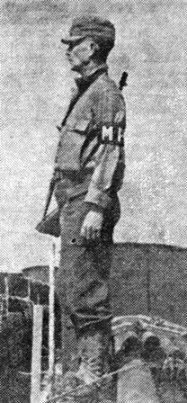 Pvt. Derrel Stanley stands guard over freight cars carrying U.S. military supplies. The freights are loaded with
materiel and supplies for shipment over the Stilwell Highway.
Pvt. Derrel Stanley stands guard over freight cars carrying U.S. military supplies. The freights are loaded with
materiel and supplies for shipment over the Stilwell Highway.
|
STOLE PLANE
Cases in Murray's files are not without humor. One G.I. in India decided one day he wanted to take a joy ride in a plane. Although he had never flown a ship, he sneaked into a C-47 parked on the airfield, taxied to the take-off strip and gunned the big transport down the runway. The ship got 50 feet off the ground, then nose-dived to earth. The would-be pilot emerged from the wreckage with bruises and lacerations and a "vacation" in the stockade.
Another time, two G.I.'s were tardy in returning from furlough. They tried to get a plane ride, were unsuccessful and proceeded to steal a C-47. These neophyte airmen were successful in getting the ship off the ground and managed to pilot it to the field near their home base. But when it came to landing, they lost their nerve and parachuted to earth where they were quickly apprehended.
But the best story is the case history of two enterprising G.I.'s in Calcutta who worked a "bogus black market" racket on Indian merchants that netted them thousands of dollars before the C.I.D. stepped in.
This pair had a varying routine. Usually, they'd contact an Indian merchant, ask him if he would be interested in Parker 51 pen and pencil sets for 100 rupees each. With a resale value of 200 rupees, the merchant usually was very much interested. So, the black-marketeers would tell their victim, "We're strictly Big Time. We deal in big lots and it takes real dough. First, you've got to give us 5,000 rupees to 'fix' the PX officer who's in on this deal."
Intrigued by this promise of great wealth, the merchant would probably fork over the required amount. Sometimes the men just vanished, leaving the merchant holding the sack - in which case he was lucky. For it was when the men kept their rendezvous with the merchant that he was really taken to the cleaners.
THE RENDEZVOUS
The rendezvous was ordinarily set for a late evening hour in the park across from Calcutta's Grand Hotel. The merchant would appear with the required payment for the pens - 20,000 to 30,000 rupees - and the G.I.'s would meet him, carrying a wooden box, banded with steel and stenciled in official-looking manner. The merchant would hand over the money and the men would start to open the box to prove to him the merchandise was okay.
Suddenly, one of the G.I.'s would swear and say, "Turn on the flashlight. This damn box is stubborn."
When the beam of light stabbed through the night a Calcutta Indian policeman would leap from a clump of bushes nearby and bear down upon the trio, shouting and brandishing a pistol. The G.I.'s would promptly flee as would the terrified merchant, forgetting both his shipment of Parker 51's and his rupees. Later in the evening the G.I.'s and the Indian cop would meet and split the spoils.
The Indian merchants, knowing the severe penalties involved in dabbling in the black market, couldn't appeal to police about their loss. In fact, if one suspicious merchant hadn't tipped the C.I.D. off on a rendezvous, the Parker 51 Twins most likely wouldn't be sweating out long terms in a Federal penitentiary today.
NOT GESTAPO
Like their brother MP's, the C.I.D. agents are probably misunderstood by the average soldier in the American Army. "We are not a Gestapo," Murray said. "We are not out snooping for crimes not yet committed. Nor do we stick our men in barracks to spy and seek out cases. My men are trained specialists whose job it is to solve crimes committed by or against personnel on the United States Army."
Member of the C.I.D. in civilian life, for the most part, were lawyers, government agents, detectives of policemen. Lt. Col. Edwin J. Barry, chief investigator for C.I.D. in this theater, who terms himself a "Texan by preference," was a special agent in the United States Treasury Department for 18 years. Maj. Robert S. Fuchs, head of the Calcutta office of the C.I.D., was a Boston attorney and, with his father, owned the Boston Braves baseball club in the National League for many years.
Lt. William F. Purcell was a New York attorney. Agent Marcellus E. H. Smith was assistant district attorney of Weld County, Colorado. Capt. Ralph V. Gould was chief of police of North Conway, N.H. Agent Edwin R. Walls doubled in brass as a professional baseball player and deputy sheriff in Pulaski County, Arkansas. Lt. James W. Dowling, one of Murray's ace investigators, was a special agent in the Treasury Department and agent Stanley L. Bounds was a fingerprint expert in the Ohio State Bureau of Criminal Identification. Agent Virgil H. Giedhill practiced law in Bath, N.Y., while agent Charles D. Bishop was a detective on the Kansas City, Mo., Police Department.
C.I.D. FUNCTIONS
"Among the C.I.D. functions in this Theater," Murray said, "is prevention of pilfering from ships, trains, and warehouses. In this we are joined by the MP's who form the guards around the docks and on ships, on trains, at airfields and in warehouse areas. Pilfering of G.I. stores is directly felt by the men themselves. For instance, not too many months ago a wave of looting of PX shipments resulted in a drastic curtailment of PX rations to individuals.
"We must also prevent the movement of contraband from this Theater into China. Inflation and lack of luxuries in China has resulted in fabulous prices being placed on everyday commodities. Thus, in China today we
|
WEAPON INSPECTION 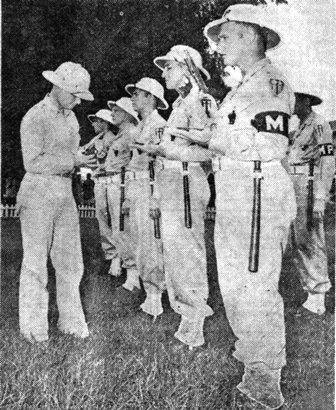 Military Police are subject to frequent weapon and personal inspection. Here Lt. Col. Mason H. Lucas inspects
the weapon of Pfc. Carl Rodwan in New Delhi.
Military Police are subject to frequent weapon and personal inspection. Here Lt. Col. Mason H. Lucas inspects
the weapon of Pfc. Carl Rodwan in New Delhi.
|
"Prevention of the movement of goods to this most fantastic black market in the world's history is necessary, not only because it tends to upset even further the economic stability of China but the money and drugs and weapons eventually end up in the hands of the Japanese. Thus, any American who dabbles in the black market may be guilty of aiding the enemy."
An MP captain walked into the room. "Guess the major is going overboard on his C.I.D. glamour boys and giving us MP's a cold shoulder," he said. Murray grinned and nodded. "Guess I'm guilty alright, but there's still time to get a word or two in for my fellow MP's.
"But," he added, touching on a sober note, "any publicity either of our sections has gotten has presented us, for the most part, in an unfavorable light."
WITH MERRILL
Few G.I.'s realize, for instance, the major pointed out, that a platoon of MP's marched all the way with Merrill's Marauders. Or that an MP company was flown into Myitkyina one hour after the airfield was captured from the Japs and went through the 79-day siege, maintaining order, directing traffic, handling prisoners of war, guarding munitions dumps and performing a hundred other tasks that contributed to the final victory.
During the tragic Bombay dock explosions, MP's hurried to the waterfront after the first explosion and despite the risk to their own lives, evacuated the injured and maintained order. Men who were awarded Soldier's Medals for their work at the docks during the disaster are Capt. Roy H. Bass, Jr., Lt. Clarence J. Malone, Corp. Michael Kazakewitz, Pfc. Stephen Shunski, Pfc. Emmett Browder, and Agents Herman Smitley, Louis Kopacka and James R. Watts.
And, during a fire in the King George Docks in Calcutta, when a burning tug threatened to spread flames to a nearby dock area loaded with 20 planes, Pvt. Frank B. Shilling and Pvt. Joseph Jackson removed an injured crew member from the tug and then moved the burning ship away from the threatened area.
In a manhunt which extended throughout the Theater, Lt. Col. Earl O. Cullum and Pvt. George B. Crosby apprehended a murderer and brought him in for trial. This was an involved, arduous task. It included long hunts in the jungle, innumerable identification checks and contact questioning, through interpreters, of tribesmen.
UNEXCITING GRIND
But, Murray said the job of the MP, in most instances, is an unexciting grind. The MP's are the men who are stationed at a desolate outpost on the Burma-China border to guard against smuggling activities. They are the men who guard the PX and food supplies, who protect the G.I.'s from gangs. They are the men who control and direct traffic up and down Stilwell Road through all types of weather day and night. They are the men who stand security guard, who patrol towns, who guard troop movements, who supply information in railway stations, who investigate accidents. They are the men who get such irksome details as escorting dignitaries, guarding courier mail and pay rolls, forming special guards for funerals and ceremonies.
To digress for a moment, it is the traffic control system tat is one of the most important functions in this Theater. Traffic control is emphasized in the basic training of Military Police. As Murray pointed out, every minute the men received in this traffic instruction was invaluable when they were assigned here.
For the Stilwell Highway has one of the greatest one-way flow of goods of any highway in the world. Closely linked radio control points link the traffic manipulators. And with the traffic hazards incidental to the Road, the medley of drivers speaking Hindustani, Chinese and broad Yorkshire, the MP's have a highly important assignment.
They are, as Murray puts it, "Americans who used to be mechanics and truck drivers, school teachers, and newspapermen, and clerks who are now doing just what all the rest of us in the Army are doing, handling the job they've been assigned as capably as possible."
ORDNANCE TEAM ‘PIECEWORK’ SUPPLIED TRUCKS TO PIPELINE ENGINEERS
By PVT. RAY HOWARD Roundup Field Correspondent
ALONG STILWELL ROAD - When pipeline engineers of advance headquarters decided that work on the China section of the military pipeline must be started before the Japanese were cleared from the Burma Road, they knew from preliminary reconnaissance surveys that one of their biggest problems would be transportation in China.
Only a few old Dodge and International trucks, relics of the hey-day of the long closed Burma Road convoys were available. A most familiar sight along the road was a Chinese driver working on his vehicle, radiator assembly, carburetor and other essential parts removed to make the motor more accessible.
These charcoal and jing-bow burning museum pieces were still in operation, but they were absolutely inadequate for dismantling 6x6 truck and flying them over The Hump for reassembling.
An Ordnance contact team composed of T/4 Richard O. Walther of Lakewood, O., T/4 Francis H. Kristof of Bronx, N.Y., T/5 John A. Gentile of Woodbridge, N.J., T/5 Raymond H. Jagler of Owassa, Mich., and T/5 Irving A. Reich of Newark, N.J., were flown to an advance Chinese base and told their job would be to assemble all trucks flown in, and after they got them running to keep them running.
Soon parts from trucks, weapons carriers and jeeps began to pile up at the airfield. They were dumped piecemeal at the edge of the strip, and with much misgiving the contact team began work. Their only tools were regular mechanics kits.
Not even a chain hoist was available, so the resourceful quintet obtained pulleys and built a heavy "A" frame from salvaged truck chassis and airplane parts. Working until dark each day, in two weeks they had 110 vehicles in operation.
But getting the equipment running was not their biggest job. Transportation was pushed to the utmost over precipitous mountain roads, and it had to be kept rolling at all costs.
"An ordinary truck couldn't possibly have stood it," said Walther. "Loads had to be exceptionally heavy. It was enough to tear the guts out of an empty truck."
The detachment was broken down into one-and-two-man contact teams to accompany the construction units along the line. The scarcity of tools and replacement parts made improvisation the rule rather than the exception.
Until final replacement parts began to arrive from over The Hump, cannibalized parts and others wrought at the ancient forges of Chinese craftsmen kept their transportation in condition to serve the enormous hauling needs of the pipeline engineers.
To increase the hauling capacity of the trucks at hand, semi type trailers were built. The body was removed from a truck and welded to another body salvaged along the road. This bed was then mounted on a regular short trailer assembly, which had been converted to a dual-wheeled affair.
"Fifth wheel" assemblies were obtained from other wrecked trucks, and, with plate cut from wrecked Japanese tanks, were mounted on the rear of the truck. When the homemade trailer was attached on the fifth wheel, it was possible to negotiate the sharpest hairpin curve on the mountain road without having to back up.
Ordnance officers from well-supplied bases in India have expressed surprise at the overall good condition of the vehicles after several months of 24-hour per day hauling. The comparative lack of deadlined trucks was unbelievable. The five industrious G.I. mechanical wizards have not been given any extra demobilization points, but they have won the commendation of the entire pipeline section for their exceptional work.
Jewels In A Cat's Eye
Sgt. Bill Lang of the Fourth Combat Cargo Group would watch with a very skeptical gaze his buddies passing out rupees in Burma for rubies, topazes and sapphires.
Convincing the G.I.'s that the roads of Burma were not paved with precious stones was a mule of another color. Most of them were panting for the day they could return Stateside, dash down to the nearest
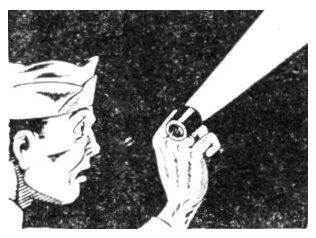 jeweler and say, "Look what I picked up in Burma for a few rupees."
jeweler and say, "Look what I picked up in Burma for a few rupees."
Unable to get anywhere with verbal cynicism, Lang turned detective. His first, and what turned out to be the final clue, came upon noticing that while red, blue, amber and white landing lights were normally installed upon newly opened airstrips, all except the white lenses had a habit of vanishing.
Lang put two and two together and broke the sad news to his buddies. Investigation showed that enterprising Burmese jewelers remove the glass from the lights, break it into small pieces which look like uncut stones and then hunt up the G.I. suckers.
Said an AACS man acting as star witness for Prosecutor Lang. "The lights aren't on the field two hours until the Burmese smash out the glass and break it into Burma precious stones."
Alas, that Burmese ingenuity.
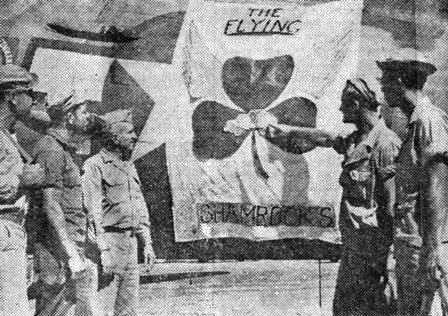 Members of the Shamrocks, who convoy trucks over the section of the Assam Road known as "The Bump" are now
flown to the end of the route to pick up their trucks. Formerly they had to be carried down by truck convoy to pick
up other vehicles. The Shamrocks have decorated the plane with their insignia. Here they show their insignia to
Lt. Col. William Morris. Left to right, Cpl. Salvador Cucizza, Pfc. William E. Johnson, Lt. Col. Morris, Pfc.
William R. Frank and Pfc. Richard G. Collins.
Members of the Shamrocks, who convoy trucks over the section of the Assam Road known as "The Bump" are now
flown to the end of the route to pick up their trucks. Formerly they had to be carried down by truck convoy to pick
up other vehicles. The Shamrocks have decorated the plane with their insignia. Here they show their insignia to
Lt. Col. William Morris. Left to right, Cpl. Salvador Cucizza, Pfc. William E. Johnson, Lt. Col. Morris, Pfc.
William R. Frank and Pfc. Richard G. Collins.
|
Salvage Major Burma Factor
ALONG STILWELL ROAD - The American taxpayer is being saved thousands of dollars monthly by classification and repair work done at this bas salvage yard in the advance area.
Reclamation and restoration of equipment results in savings of millions of man hours work defense workers back home and hundreds of tons of valuable space are released for overseas transport.
The base salvage yard started in the early days of the North Burma campaign when supplies were limited. Then the yard had to do repair work far beyond its regular duty, and in one month during the height of the campaign more than $100,000 worth of equipment was reclaimed and put back in the base QM stocks.
Under Lt. Harry F. Juhl, Manchester, Conn., base salvage officer, repair duties of the yard have been increased until they now constitute a major factor in supplies to North Burma.
At its height the shoe repair department was turning out over 3,500 pairs a month, but demands have cut the figure to 1,500. All materials used here are either procured by local purchase or reclaimed parts from worn-out shoes.
Clothes are mended and laundered, canvas is repaired and typewriter repair men are sent to more forward bases to check equipment. The catchall of the salvage yard is the blacksmith shop. Under the supervision of Cpl. Leonard Brown, Indian workers repair all unit metal salvage, which varies from pots and pans to heavy field ranges. Even steel helmets are straightened.
Much of the work done by the base salvage yard is in addition to regular duties. Sgt. Anton Joseph, tailor shop foreman, expressed the feeling of the men when he said, "The only ones complaining about our work should be the Japs."
Fall of Liuchow Seen As ‘Matter Of Hours’
Roundup Staff Article
Chinese troops, attacking in five columns, moved upon the rail city of Liuchow and its airfield, with the Chinese High Command reporting at week's end that one force had broken into the south railroad station.
Unconfirmed reports reaching Maj. Gen. Robert McClure's Headquarters in Kunming said the hub city, former 14th Air Force base, was burning, the airfield was wrecked and that Liuchow was so closely invested its fall might be a "matter of hours."
Chinese spokesman said the bulk of the Japanese defenders had been withdrawn northward toward Kweilin, where another American air base was abandoned last fall.
WU RIVER FORCED
Other Chinese forces driving from captured Foochow toward Hangchow Bay have forced the Wu River, advancing against only fitful resistance from the rapidly-withdrawing Japanese along that coastal sector. Since their one half-hearted, futile effort to check the Chinese coastal drive with a seaborne relief force shortly after Foochow fell last month, the Japs have made no apparent move to reduce the threat to their vital Hangchow Bay front through which is funneled much material for the Jap armies in China.
MOVE TOWARD ICHANG
Earlier in the week, Chinese forces were reported to have routed 2,000 enemy troops in southwestern Honan Province. A few days later, a Chinese communiqu announced capture of two towns just north of Ichang.
Chungking reported that Japanese forces are evacuating huge Hainan Island in the Gulf of Tonkin, throwing open to U.S. air and sub attacks the sea supply lanes of a half million enemy troops in Southeast Asia who are already isolated by land. These included Jap dispositions in Indo-China, Thailand, Malaya, Singapore and lower Burma.
|
THEN COOLIES RUN IN
CALCUTTA - The QM warehouse of the Base General Depot in Calcutta boasts an engine that is an engine only by courtesy.
It is a "made in Germany" job, formerly owned by the Indian jute mill in Calcutta and loaned to the depot QM group, which uses the first floor of the mill for storage space.
There's no firebox on this four-wheeled job. The steam is pumped into the boiler from the powerhouse of the jute mill. The engine runs on this steam until the gauge shows at the danger mark, then it returns to the powerhouse for more steam.
If the steam gives out before the engine can make it back to the powerhouse, the inevitable and long-suffering Indian coolies have to push it back to the source of supply.
The little dynamo boasts a switchman named "Pepsodent" and an engineer who is bell-cord happy. It has a top speed of 10 miles an hour. The switchman thinks nothing of riding the engine, then jumping off and running ahead to throw the switch before it is reached by the locomotive.
The engine is known as Old 971. It is known by other names, especially by the Indian coolies who have to push it back to the powerhouse on occasions.
Secrecy Lifted From X-MB1 Cream Freezer
4TH COMBAT CARGO GROUP, INDIA - The "zenith secret" classification on the AAFS newest secret weapon, the X-MB1, was lifted this week at this Combat Task Force base, and the details are ready for the reading public.
Cpl. Sidney Grant, San Diego, Calif., together with Pvt. Richard teel, Kansas City, Mo., are the designees (patent pending) of this most scientifically developed weapon since the advent of jet propulsion. It supplies the answer to this Theater's greatest need - ice cream.
FROM WASHER
Converted from an old washing machine and salvaged plane parts, the X-MB1 (X for experimental, and MB for morale builder) was preflight by the inventors while scores of ice cream addicts stood by in anticipation as the No. 1 American delicacy was lifted from a five-gallon can plainly marked carbon tetrachloride.
Though first experiments failed when ice formed on the outside of the porcelain boiler, instead of freezing the mix, the doughty pair saved the day by lining the interior with a wooden barrel. Twenty minutes later, the first ice cream (vanilla) in the history of the base was ready for the surprised personnel.
STILL WASHES
The original idea was forwarded by Lt. John T. Boyle, of Fon du Lac, Wis., adjutant of one of the airdrome squadrons. Another officer, Lt. Edward E. Sutton, of New Orleans, La., of a supply section, remarked that the Thor washer just freighted to the Base looked like an ice cream freezer. Cpl. Grant and Pvt. Teel, seizing upon the idea, went to work on the machines, and - presto - it rolled off the production line.
"The best part of this contraption," said Grant, "is that you can always take out the unit and wash your clothes after whipping up a batch of ice cream. Now we're trying to fix it so that you can freeze the cream and wash your clothes at the same time."

MISSION INCOMPLETE War is tough and they play it rough, As they have since long ago And a flyer knows that his vicious foes Are trying to lay him low So he's on his guard when he's fighting hard Because he expects the blow But what can he do when he's trusting you And he finds that his faith's misplaced When he's flown through a hell of shot and shell The toughest he's ever faced And he does get by and he still can fly And he heads for the spot he's based? Then an engine spits and another quits Though he leans on the throttle stops And the boosters whine but a dirty line Is the cause of his failing props He may pull his hair in a wild despair But he loses his speed and drops His buddies camp on the taxi ramp Til their share of the chow is burned But that very crew is overdue While the rest of the group returned He left his flight and he dropped from sight Is all that his comrades learned |
|
And prepare for a good night's sleep? Can you close your eyes and with gusty sighs Imagine you're counting sheep? Is your conscience clear as the kind of tear That mothers should never weep? Or are you the guy who is glad to try A trick that he learned from Joe. Who will start a test and then skip the rest Because no one will ever know Who can pull a bluff when the job is tough And the right way is too damned slow? Let your memory range to that engine change When you ran out of cotter keys When you cursed "Supply" and the other guy And you thought that your - would freeze You said "What the hell, they can never tell 'Cause it is something that no one sees." Then come with me and I'll let you see A tent where the echoes play Where a shoe and pail and the morning's mail Have laid since the other day Where the stove is cold and the blankets rolled For someone to take away You might say in an offhand way "Now who in the hell lives here?" You'd spit on the ground and look around To see if they left some beer "Why was I sent to an empty tent By a soldier who acted queer? |
|
Is that why your cheeks have paled? Brother, you knew this absent crew Who flew where the rockets wailed Your eyes grow round, you're on hallowed ground, The home of the men you failed. It wasn't the smash or the blinding flash Of ack ack that hit their mark Or losing their way on a story day, Or pilotage after dark, Or crossed controls or barrel rolls, Or fire from a static spark. It was done by a lad who knew how bad A dirty line can be But he wanted to go to the picture show So he didn't have time to see 'Twas a lazy hand on their own hardstand That sided the enemy. If there comes a day, as well it may, When your ship is not with the rest Can you tell their friends, when the mission ends, While you stand in the eagle's nest "If they don't come back, it must be the flak; By God, I did my best." - LT. MARSHALL L. LEVIN |
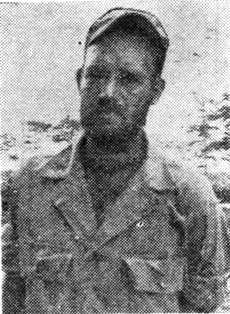 T/5 Charles Harding recently returned from a 36-day trek in the Burma jungle, searching for American dead
after an air crash. Here he is after arriving back at an American base.
T/5 Charles Harding recently returned from a 36-day trek in the Burma jungle, searching for American dead
after an air crash. Here he is after arriving back at an American base.
|
By SGT. ART HEENAN Roundup Staff Writer
The body of an American soldier is buried in a grave five feet deep, two feet wide, and six feet, six inches long.
From the seaports of India to the jungles of Burma to the towering mountains of the Himalayas and under the plains of China repose the bodies of American dead, half way across the globe from their native land.
The task of identifying and burying these men of ours falls to the Graves Registration Platoons. Daily these men perform their grim duty, searching for and burying the mortal remains of the men, and sometimes the women, of America.
Theater Graves Registration Officer is Capt. James S. gray, an advertising man in civilian life. Over Gray's desk flows the information that tells where and how each casualty is buried.
Gray explained that the Army is establishing centralized military cemeteries all over the India-Burma Theater. If it is ever decided to send the bodies home, a topic of recent Congressional discussion, the Army will be ready as far as knowing the location of most of the dead.
CENTRALIZED COUNTRIES
Gray said his men are now working in the areas of Warazup and Nphum Ga, where Maj. Gen. Frank Merrill's Marauders fought bloody battles against the Japanese in North Burma. They are moving the Marauder dead to the military cemetery at Myitkyina. Work and searches like this entail weeks of living in the jungle, with all its attendant evils.
One recent jungle search to find the victim of a plane crash kept the Graves Registration men in the jungle for 36 days. They were supplied by air dropping, but due to weather conditions they were four days without Army ration and had to subsist on jungle vegetables, elephant steak, monkey soup, and whatever they could find that was edible.
AFRAID OF BODIES
It was on this same operation that T/5 Charles Harding, Pfc. George Lund, and Pvt. Leo Jurewicz found that animals are as reluctant to carry dead bodies as the tribesmen, who superstitiously shudder away from any contact with the dead. The registration party had completed its task and packed the bodies in pouches provided by the Army. They tried to hoist the pouches on an elephant but he shied away and horses reacted the same way. They finally persuaded tribesmen to pack the pouches on poles and carry them.
Gray said most plane victims are found after tribesmen bring remnants of the aircraft into an American or British camp. Then they guide members of the Graves unit and Search and Rescue men to the scene. The Graves men bring out the dead, or bury them and mark their graves. The Search and Rescue soldiers take care of the living.
We asked Gray how bodies were identified if the dog tags were missing. He explained that fingerprints, denture formats and the process of elimination were used.
SHOE IDENTIFICATION
After the fingerprints are taken they are checked against the AG and FBI files. If fingerprints, the most reliable method, are not available, a sketch is made of the dental work and this is checked with Army records. If neither of these is available the Graves men identify all the crash occupants possible and then proceed to sort the rest.
Grave gave one example. In a recent plane crash, three out of five victims were identified. They knew the names of the other two corpses but couldn't distinguish between them. So they took their shoe sizes and checked them against Army records for individual identification.
"The worst part of this job is the letters we receive from relatives of the dead men," sighed Gray. "Most of them want to know if they can have the bodies sent home for burial. When I have to answer letters like that and stay official at the same time I wish the Army had given me a different classification number."
|
You can now swim in waltz time at the G.I. pool in Agra, thanks to a loud speaker system installed by local VU2ZW radio station wallahs.
No G.I. tears were shed at Ceylon, reports T/5 Bob Rees, when a headquarters company supply sergeant, an oft-reviled character, went to the U.S. via the point system. He was a supply sergeant's supply sergeant - cold hearted, tight fisted, uncompromising. He posted the following notice on the company bulletin board: "As of May 14, Sgt. --- has been relieved of his duties as supply sergeant. He is no longer serving in that capacity. HE HAS RETIRED."
Underneath the neatly-typed note was a biting two-word comment, scrawled in pencil - "Thank God."
Below that, for good measure, another poison penman added: "Amen."
While the Words From the Weeds editor turned damply around to scream at a bhisti whose aim at the kuss-kuss was strictly off the beam, your man Fink pilfered the following letter:
Dear Roundup:-
I see in the Roundup where 1,535 soldiers from the India-Burma Theater were sent back to the States on the point system during the month following the defeat of Germany. The average score of the men sent home was 92. Will you please tell me what the hell I'm still doing in India? My MOS is 405 (clerk). I've been overseas (all of it in the tropics) 59 out of the past 62 months and to go with that I have 114 points. Don't tell me I'm a forgotten man because Headquarters must have my service record and must know the number of months I have overseas and also the number of points I have.
All I want out of the India-China Division, ATC, is a square deal. My total assigned time in the States is six days. The rest of the time was spent awaiting shipment. Is it any wonder I'm entirely disillusioned? - A War-Weary Soldier - S/Sgt. ROBERT D. PARK
A sergeant from Brooklyn, whose horseback riding had hitherto been restricted to the merry-go-round at Coney Island, elected to impress one of the Red Cross lovelies at Sabathu Rest Camp by teaching her how to ride. Gallantly, he proceeded with detailed instructions, illustrating with his own mount, an ancient hide of dubious ancestry. He subconsciously felt that the girl seemed amused, but he dismissed this idea because that area of his anatomy which is situated in the vicinity of his hip pockets started to receipt for a disturbing jolting. later, to his embarrassment, the Brooklyn cowboy discovered that the girl (Georgianna Isham) hailed from Arizona and had been practically weaned on a nag.
If this is fiction, blame it on India Ink, base fishwrapper for an ASC Depot in Eastern India. According to the usually-reliable Ink two local G.I.'s who for over a year and a half had (knock on wood) escaped the sick book, recently received two man-bits-dog letters. One's brother wrote from Chicago: "Just got back from the doctor's. Guess what I've got - amoebic dysentery." The other's mother, writing from San Diego, informed him: "Your father is just recovering from an attack of malaria."
|
Moans On Departure
By SGT. JOHN R. McDOWELL Roundup Staff Writer
There is something about preparing for a trip to China that brings out the worst in one's fellow men. Many India-Burma G.I.'s who have already indulged in the "Great Adventure" by signing up to drive a 6x6 over the Stilwell Highway with a China-consigned convoy have learned this first-hand. Many of you who plan to make the trip in the future will learn soon enough.
When the Simon Legree, complete with green eyeshade, four-for-an-anna stogies and ink-stained bushjacket, whom we of the Roundup staff refer to as Ye Editor, cracked the whip over my cage and informed me I was going to China to do a series of articles on our Allies at war. I suddenly discovered I had hit the "How to Win Friends and Etc." jackpot.
A master sergeant who had trampled me underfoot on several occasions while bent upon his many secret and urgent peregrinations about Delhi spied me emerging from the India Coffee House the very next morning. Clasping my arm in a friendly sort of half-nelson, he propelled me back into the dim interior of Queensway's fashionable beanery, stuffed me into a chair and shouted to the beturbaned bearer. "Bring this man two iced coffees, poached eggs and toast. Jaldee!"
The effervescent Zebra massaged my creaking backbone with an energetic hand, leaned across the table and whispered hoarsely: "So you're going to China. Well, well, well!"
A heavy-knuckled finger prodded the area midway between my diaphragm and my Adam's apple.
"Now, here's what I want," the sergeant bellowed in a confidential roar. "I want you to pick me up some souvenirs. Just something to send home as a remembrance of China."
Whereupon a shopping list was thrust into my hands, along with Rupees 20. The list read something like this: Jade broach, necklace, earrings and ring for wifey; blue silk yardage for mother, name chop for Junior; Japanese rifle, battle flag and a bronze temple bell for me. All on Rupees 20.
Then there is the gregarious member of the species homosapien - the "I've-got-a-friend-somewhere-in-China" character.
This individual approached you with a routine that goes something like this: "I hear you're going to China. Now, brother, that's really a coincidence. Why only yesterday I received a letter from Mable and she said that her Uncle Percy's nephew Oscar is now in China with some Air Force outfit. I think he's a pilot, although it's possible he's a mechanic or a clerk. Look him up and give him my regards, will you?"
Of course, the pest who really gets on your nerves is the guy with his arm in a sling who has just returned from a convoy trip to China. He claims he broke his arm while trying to drive his big truck through one of the many landslides he encountered on the Stilwell Road, but the truth of the matter is he broke his flipper falling down a dim stairway in a house where he was pursuing affairs of the heart.
For hours on end, this person will regale you with stories of bloodshed and privation which befell him on his odyssey to Cathay. And, every so often, he will punctuate a particularly harrowing experience by thumping his cast-bound arm on the table or bar or whatever piece of furniture is within range.
By the time he has thoroughly shattered your peace of mind with tales of landslides obliterating whole sections of convoys, trucks hurtling off the side of the road into yawning gorges, murderous bands of bandits plying their nefarious trade on convoy stragglers, parties of isolated Japs setting up road blocks, Jap Oscars strafing the trucks, and pythons and cobras sharing your sack at night, you are quite willing to cry "Uncle" on the whole deal and slink back to the Indian gin and prickly heat anonymity of G.I. life in the Big City.
One suddenly is faced with a legion of minor pests, too. These range from the red-nosed colonel who visited China when his vacation ship, the S.S. Lurline docked at Shanghai for 18 hours during a cruise through the Orient in 1927 to your many physiological-curious friends.
The colonel is strictly a bore. When he disseminates load and long on his knowledge of the lore of the East, picked up during his "travels" in China, you can nod and smirk at polite intervals while contemplating the once-happy days of rotation or the possibility of getting a few snifters on the cuff that evening.
The Roundup is a weekly newspaper of the United States Forces, published by and for the men in Burma and India, from news and pictures supplied by staff members, soldier correspondents, Army News Service and United Press. The Roundup is published Thursday of each week and is printed by The Statesman in New Delhi and Calcutta, India. Editorial matter should be sent directly to Capt. Floyd Walter, Hq., U.S.F., I.B.T., APO 885, New York, N.Y., and should arrive not later than Saturday in order to be included in that week's issue. Pictures must arrive by Friday and must be negatives or enlargements. Stories should contain full name and organization of sender. Complaints about circulation should be sent directly to Lt. Drexel Nixon, Base Section APO 465, New York, N.Y. Units on the mailing list should make notification of any major change in personnel strength or any change of APO.

|
JUNE 28, 1945
Original issue of India-Burma Theater Roundup shared by Hal Baker
Copyright © 2009 Carl Warren Weidenburner
TOP OF PAGE PRINT THIS PAGE ABOUT THIS PAGE SEND COMMENTS
PREVIOUS ISSUE CLOSE THIS WINDOW NEXT ISSUE
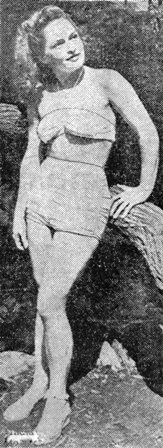 Stage star Mary Healy was selected as the 1945 Legitimate Theater Swim for Health Week Girl. She was chosen
for her photogenic qualities, form and swimming ability. We wonder if she can swim?
Stage star Mary Healy was selected as the 1945 Legitimate Theater Swim for Health Week Girl. She was chosen
for her photogenic qualities, form and swimming ability. We wonder if she can swim?
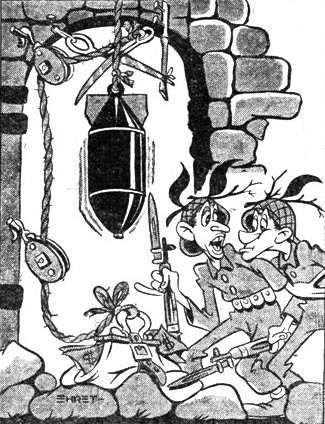
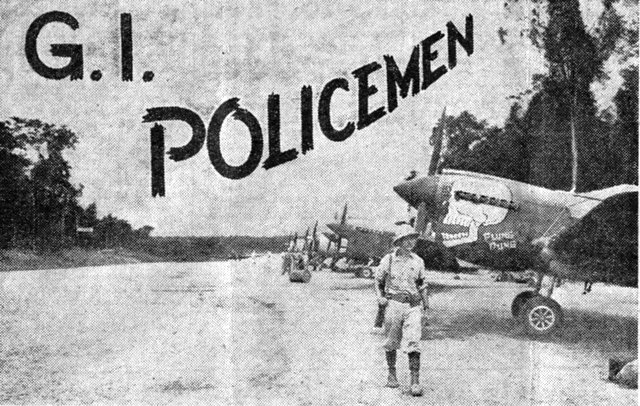 Pfc. John L. Cavey, of an MP Combat Battalion, is shown doing MP duty at an airstrip in Burma. Guarding the
forward strips from marauders and saboteurs is one of the duties of the Military Police in the India-Burma Theater.
Pfc. John L. Cavey, of an MP Combat Battalion, is shown doing MP duty at an airstrip in Burma. Guarding the
forward strips from marauders and saboteurs is one of the duties of the Military Police in the India-Burma Theater.
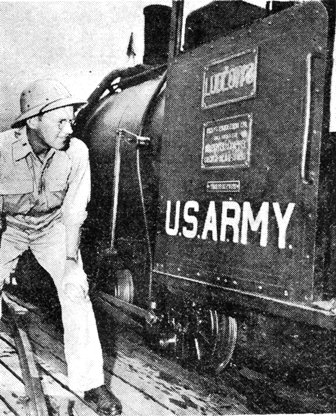 Lt. W. G. O'Hare of Charlestown, Mass., inspects the miniature engine used by the Base General Depot at Calcutta, where he is supervisor of a section of the warehouse. The engine, made in Germany, does not generate its own steam but has live steam pumped into it.
Lt. W. G. O'Hare of Charlestown, Mass., inspects the miniature engine used by the Base General Depot at Calcutta, where he is supervisor of a section of the warehouse. The engine, made in Germany, does not generate its own steam but has live steam pumped into it.

